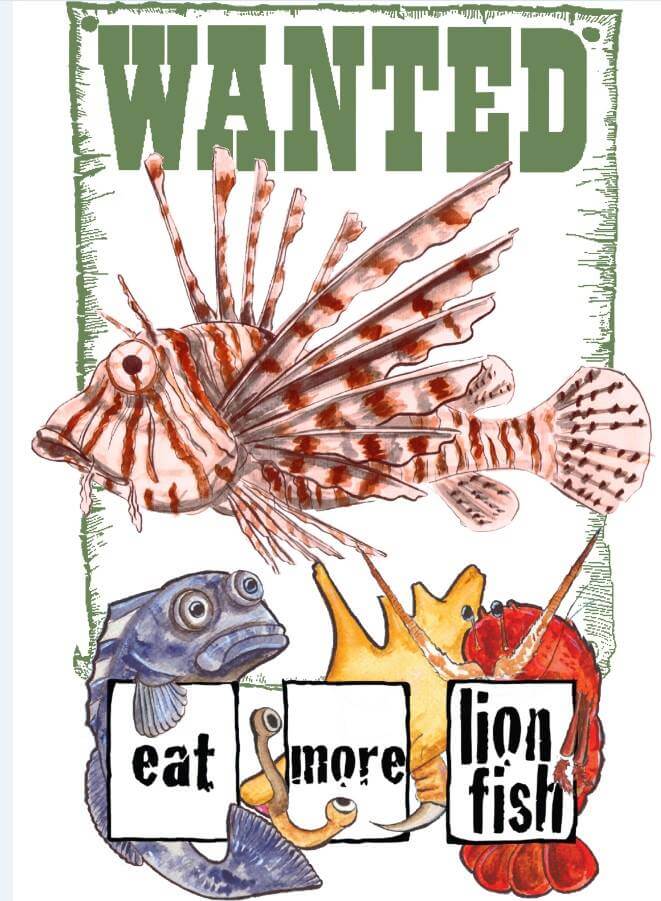Bay Islands Lionfish Spearing License
As a marine reserve, it's illegal to spearfish in the Roatan Marine Park. Lionfish are the exception, since they have no natural predators in the Americas and their venomous spines provide a strong defense against potential predators.
The lionfish is a majestic creature. With beautiful coloring and amazing structure, there is something magical about watching a lionfish riding the current off the reef. If you're diving in Southeast Asia or Australia, it's always a delight to see these fish, and as professional divers, we love pointing them out to our guests.
However, as many of you know, lionfish are not endemic to the Caribbean. There are many viable theories as to how they were released, but most point to the private aquarium trade. As a result of them accidentally being released in this area, their numbers have exploded and people all over the Caribbean and Americas are struggling to curb their population.
Photo credit Roatan Marine Park
As a marine reserve, it's illegal to spearfish in the Roatan Marine Park. Lionfish are the exception, since they have no natural predators in the Americas and their venomous spines provide a strong defense against potential predators. As a result, the Roatan Marine Park Invasive Lionfish Control Program was developed as a proactive measure to get the local community, snorkelers, and divers involved in helping curb lionfish numbers in these waters.
To obtain your Bay Islands Lionfish License, you start by attending a workshop conducted by the Roatan Marine Park that teaches you about proper spear usage, education on hunting regulations, and includes an in-water skills assessment using coconuts as target practice. In the water, it's important to demonstrate good spatial awareness and buoyancy, since the purpose of hunting lionfish is to protect the reef, and if you're banging all over it and killing the coral, it defeats the purpose of this program. The Roatan Marine Park Lionfish License is $50 and includes a registered spear, the workshop and your license, which is valid for 2 years. The Roatan Marine Park normally runs these workshops twice a week from their Eco Store in West End based on interest, but they can run special workshops for larger groups as well.
We love it when we hear divers express an interest in lionfish hunting. From eating a tasty sustainable guilt-free fish option to competing in our annual Roatan Lionfish Derby, or for the thrill of the hunt while helping defend the reef, there are so many good reasons to support Roatan's lionfish program. Talk to your dive center and see how you can get involved today!
PSA: Before You Watch "Finding Dory"
efore you watch Finding Dory and get caught up in the Blue Tang hullabaloo, please remember that Blue Tangs belong in the ocean, not in your personal aquarium.
Well, the day that everyone has been waiting for, for literally years has arrived - Disney Pixar's Finding Dory will soon hit theaters!
Now, based on the trailers, it looks like Finding Dory has a pretty strong anti-captivity message, which we are grateful for. As dive instructors and conservationists (the two should really go hand in hand), it pains us to see animals that don't do well in captivity, like whalesharks and dolphins, held in a confined space. While some aquariums work hard to educate the public and are picky about the animals that they keep in captivity, a great deal are not and will capture anything that brings in customers and money.
So before you watch Finding Dory and get caught up in the Blue Tang hullabaloo, please remember that Blue Tangs belong in the ocean, not in your personal aquarium. Just like Clownfish sales spiked after Finding Nemo came out, the animals featured in Finding Dory, especially the Blue Tang, will be in higher demand. The biggest difference between Clownfish and Blue Tangs is that they still haven't figured out a way to breed Blue Tangs in captivity, so any Blue Tangs that you get for your aquarium will be taken off the reef somewhere, away from where they belong. Blue Tangs have a bigger travel radius than Clownfish do so they don't do well in captivity, and they are incredibly important for coral health because they eat the algae that risks suffocating the coral if left to grow unchecked, so it will be devastating to any reef system to lose them.
So please, if you watch the movie and feel inclined to see more Blue Tangs, go see them in the wild. They're actually very quirky and funny, just like Dory, although hopefully not as forgetful! We love watching the big schools of Blue Tangs descending on the reef and eating up a storm, without a care in the world if anyone else is around. If you love Dory (or Nemo, or Hank, or Destiny, or Bailey), let them just keep swimming!
Always dive with a buddy!
Just because you don't want to see Dory in captivity doesn't mean you can't have fun with it, either! For those of you more inclined to give in to Disney magic, you can also bring Dory diving with you! Nemo and Dory have been our dive buddies for five years now, following us as we dive all around the world. Just keep swimming, indeed.



